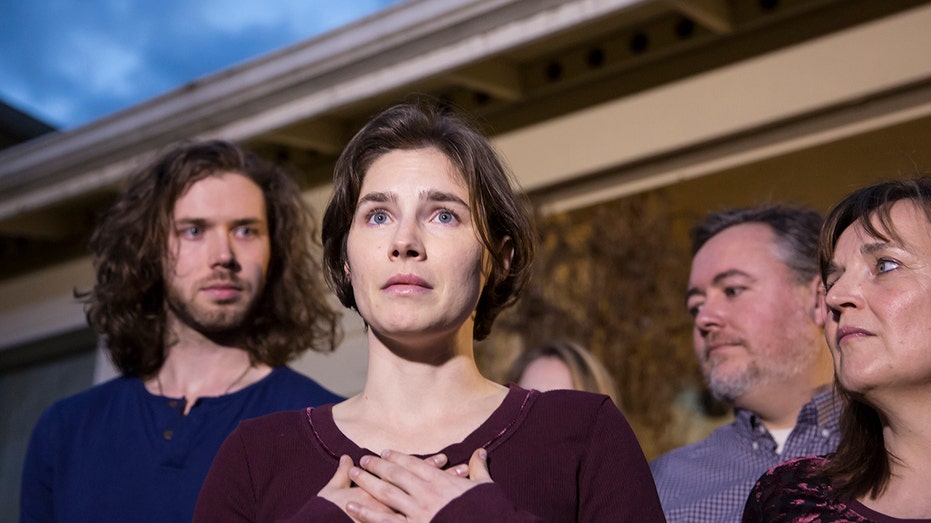Amanda Knox, whose story captured the world’s attention during her lengthy and arduous legal battle, has opened up about her transformative experiences during her time behind bars. In a compelling recount, Knox shared that a Catholic priest played a pivotal role in helping her regain her lost faith in herself. This interaction occurred when she was serving a lengthy prison sentence in Italy, after being convicted of the 2007 murder of her British roommate, Meredith Kercher, a crime Knox consistently maintained she did not commit.
Knox spent nearly four years in an Italian prison before her conviction was ultimately overturned in 2015. The saga of her wrongful imprisonment became a notable case, sparking discussions about judicial integrity, media sensationalism, and the challenges that come with being thrust into the public eye under distressing circumstances. As Knox has continued to rebuild her life post-incarceration, she reflects on the experiences that shaped her both during and after those tumultuous years.
In her recent remarks, Knox emphasized the significance of the Catholic priest who visited her while she was incarcerated. She expressed that the priest “saw her humanity,” a statement that resonated deeply with her and underscored the importance of compassion in dire circumstances. Knox explained that his presence was a reminder that there was still a sense of goodness in the world, even in the harsh environment of prison.
This acknowledgment of her humanity proved vital for Knox during a time when she often felt depersonalized and dehumanized. The conditions in which Knox was confined—marked by isolation, fear, and uncertainty—could easily lead one to despair. However, the priest’s compassionate approach allowed her to reconnect with her sense of self-worth and to find hope in an otherwise bleak situation.
Knox discussed how the priest’s visits provided her with not only spiritual support but also emotional resilience. These moments of connection were instrumental for her mental health, by enabling her to remain hopeful amidst overwhelming uncertainty. For Knox, the realization that someone recognized her as a person deserving of dignity and empathy was profound.
The impact of these conversations went beyond mere solace; they contributed to a gradual rekindling of her inner strength and faith. Knox stressed that faith, in the face of adversity, is not strictly about religious belief, but also involves believing in oneself and the fundamental goodness of people. The dynamic with the priest facilitated this journey of self-discovery.
Throughout her ordeal, Knox found herself grappling with issues of identity, innocence, and the public’s perception. The media frenzy that surrounded her case often focused on sensational elements rather than the truth. This misrepresentation contributed to a pervasive sense of isolation and misunderstanding. However, the priest’s ability to affirm her humanity served as a counterbalance to the negative commentary she faced.
The dialogue between Knox and the priest explored themes of forgiveness, redemption, and the quest for justice. They engaged in discussions that were reminiscent of the larger existential questions Knox was wrestling with—what does it mean to be free? Can a person be wrongfully accused and still find a way to thrive? The priest’s guidance helped Knox position herself on a path towards healing and self-acceptance.
Knox shared that these encounters also spurred her to reflect on the concept of justice. Prison, for her, became a crucible for examining broader societal issues regarding the legal system, incarceration, and the treatment of those who are wrongly accused. It fueled her desire to advocate not only for herself and her case but also for other individuals who find themselves in similar situations of wrongful conviction.
Since her release, Knox has transformed her experiences into advocacy for justice reform. In her ongoing efforts, she speaks out about the fundamental flaws embedded in the criminal justice system, especially focusing on how public perception can sway outcomes. She aims to bring attention to the psychological toll of wrongful imprisonment and the pressing need for reforms that better protect the rights of accused individuals.
Knox’s journey has not been without challenges, as she continues to confront the lasting effects of her imprisonment. She faces the task of reconciling the person she was before her incarceration with the person she has become. The stigma associated with her case lingers, but through her advocacy work and personal growth, she strives to carve a new narrative for herself.
In reflecting on her time in prison, Knox emphasizes the importance of community support and the role of individuals who advocate for one another. She notes how powerful it can be to have someone believe in you when doubt permeates your world. Knox’s story of resilience is not just about overcoming the legal challenges she faced but also about how human connection—no matter how small—can foster healing.
Mental health, especially in stressful and dehumanizing environments, emerged as a highlight of Knox’s discussions. She underscores the necessity of mental health resources in prisons, aiming to shine a light on how the lack of such support can exacerbate the already challenging circumstances faced by incarcerated individuals. Knox aims to leverage her story to advocate for better mental health access in correctional facilities, a mission fueled by her personal experiences and the lessons learned during her time with the priest.
In conclusion, Amanda Knox’s reflections on the impact of a Catholic priest during her incarceration reveal the profound strength of compassion and humanity. Her experiences shed light on how essential it is to recognize the humanity of individuals within the justice system, regardless of their circumstances. As Knox continues to advocate for justice reform and mental health awareness, her journey serves as a stark reminder of the importance of community, kindness, and the resilience of the human spirit.
Knox’s narrative is not just a tale of survival; it urges society to reflect on how individuals entwined in the criminal justice system are treated and perceived. Ultimately, her story emphasizes the power of empathy, understanding, and the essential role these qualities play in the journey towards healing and restoration.
































